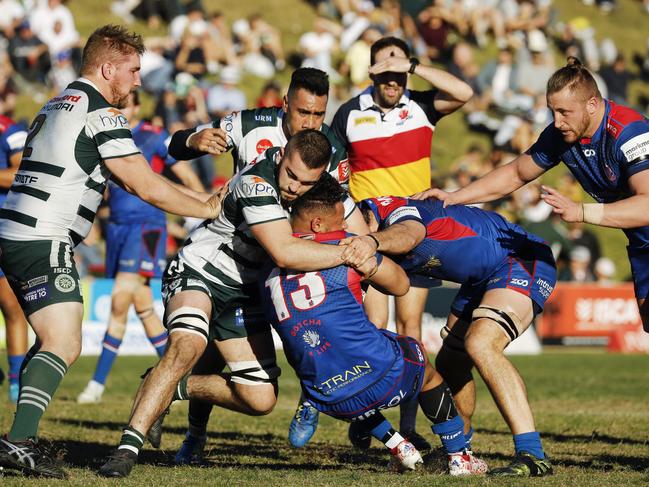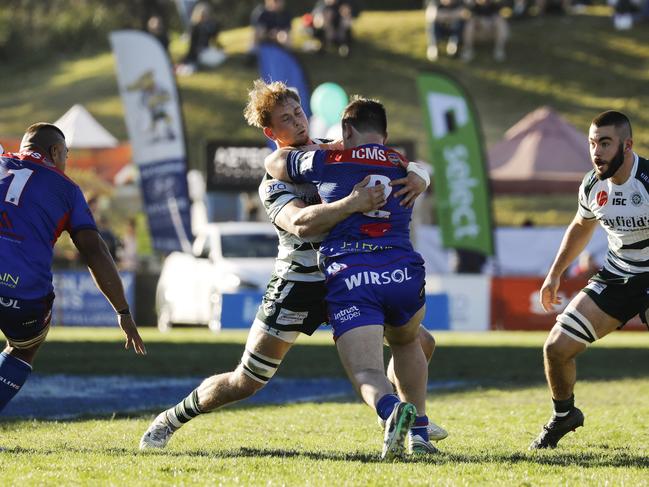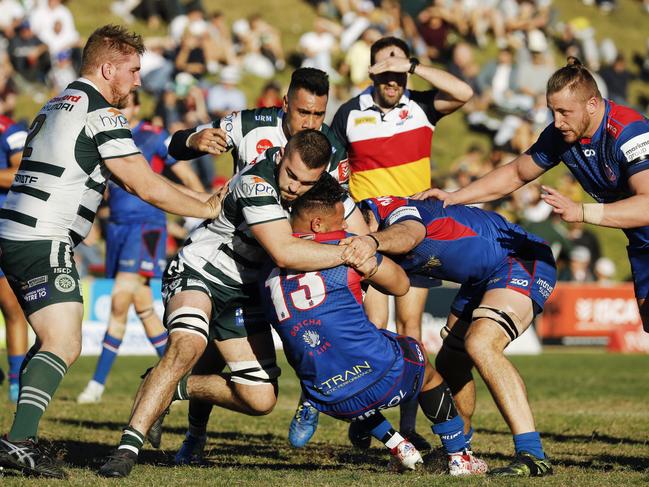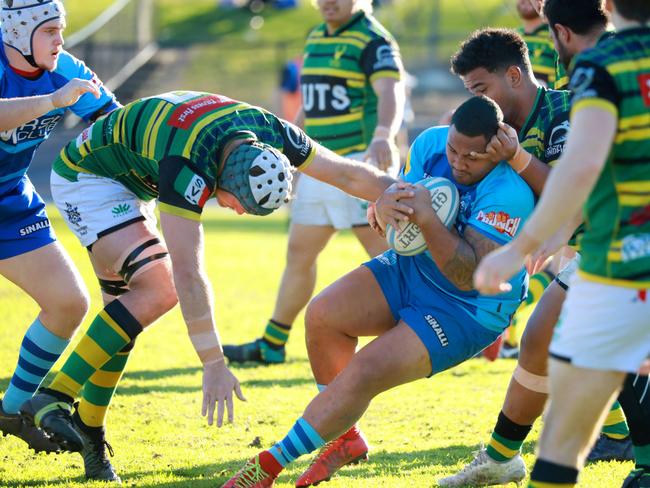Why Shute Shield will adapt faster than rest of world as rugby’s new tackle law is introduced
The Shute Shield will kick off a new era for all contact sport with rugby’s new tackle height law to be introduced to the competition.

Rugby
Don't miss out on the headlines from Rugby. Followed categories will be added to My News.
Rugby enters a new era on Saturday, for all contact sport, as the amended tackle height law is introduced across the Shute Shield and shoulder-height tackles will be penalised for the first time in a major competition.
But the boss of NSW’s rugby referees believes Sydney’s club tournament will adjust quicker than overseas nations who have also introduced the new rule to combat head injuries, because more than 100 trial matches have already been officiated under the law in the past three weeks.

President of the NSW Rugby Referees Association, David Marshall, declared he does not want a “whistleathon”, even though coaches believe high penalty counts and slower games will be common over the first few rounds.
“What we understand from when this has been implemented overseas is that it takes a few weeks to adjust, penalty counts go out and then come back in and stabilise as everyone adjusts to it,” Marshall told this masthead.

“I hope that we’re well ahead of that curve, with the work we’ve done with the clubs in the trials.
“We’re really hopeful that was we go into the competition rounds, the adjustments aren’t going to be as extreme as they have been overseas.
“It’ll depend how different teams adapt to it, none of us are sure how it’ll play out, but I think you’re going to see a lot more continuity in play and passes getting away, as opposed to the ball going to ground and competing for the ball on the ground.”
ROUND 1 TEAMS: Former Wallaby named, question marks over Beale
Spectators must also become used to seeing penalties that previously would have been deemed as good hits penalised, and that leaves referees open to more abuse than usual.

“The referees are trying to keep everyone safe, we’re managing new expectations, but also we don’t want to turn it into a whistlefest,” Marshall said.
“The leadership of the coaches and players will go a long way to helping the fans in their understanding of what we’re trying to do.
“If the coaches, captains and players remain respectful, which I think they will, and the referees get the balance right, that will really help.
“You will have the odd one in the crowd no doubt who doesn’t quite understand what’s going on. That’s a normal part of rugby.”
Premiership-winning Randwick coach Stephen Hoiles expects most games to feature more penalties and less running rugby in the opening month of the tournament.
“It will be about who adapts, who can evolve on the run, because while we think this is tackle-focused which will bring in offloads, it’s probably not going to happen for a while,” Hoiles said.

“I think it will take a fair few games with a lot of high penalty counts, and slower games, a bit of pain before we see the benefits of that, in terms of the quality of the game.
“Initially I think there’ll be high penalty counts. And penalty counts just give you an opportunity to slow the game down.
“And then as players and referees and teams work out what it is, then hopefully we’ll see a faster game with more offloads.”
Sydney University coach Todd Louden has already noticed a major increase in lineouts during the trial matches, as teams receive penalties for high tackles and kick the ball into touch.
Tackling a maul from a lineout will not be penalised, and tackling players peeling off a ruck will also be ruled in the same way as previous seasons.
But when a ball-runner is in open play, if a tackler’s shoulder hits him higher than sternum level it will be penalised.
“We need to keep vigilant, some of the clubs will adapt quicker than others, some of the referees will adapt quicker than others,” Marshall said.
“But largely we’re on track. The one-on-one tackles are relatively straight forward I think, to officiate on. It’s when you’ve got two or more players in a tackle, there are more things to consider in how to officiate it.
“What we’re trying to find the balance on is, ‘What is the intent here?’ If two players are bringing their heads close together with force, that’s what we’re trying to remove.

“We’ve been working really hard with the clubs during the trials, and it’s been really pleasing to see the positive engagement around this issue.
“The messaging was that we’re all learning; the coaches, the players and referees are all learning how to officiate it. That’s continued during the trials.
“There’s been really good discussion with captains, coaches and players before trial matches, good respectful communication on the field as we’ve all adjusted, and also post-match.
“Look, great credit to the clubs - the coaches and the players – in understanding that we’ve got to all adjust. They are working hard at it, and so are the referees.
“So it’s more of a continuum, come round one, from what we’ve been doing. We’ve been working hard with the teams to make sure they are ready for round one.
“We’re all a bit curious as to how it will all sort itself out over the next couple of weeks, and we intend to keep those open communications.
“Everyone accepts it’s here, everyone accepts the need for it and the positive around it, and they’re all accept it.”
World Rugby is studying the impacts on the game of this lower tackle height in France, New Zealand, South Africa, England and Ireland, and will closely monitor the results in the Shute Shield and Queensland’s Premier Rugby competition.
They will then decide if the law will be introduced across the entire professional ngame, including Test matches.
More Coverage
Originally published as Why Shute Shield will adapt faster than rest of world as rugby’s new tackle law is introduced





